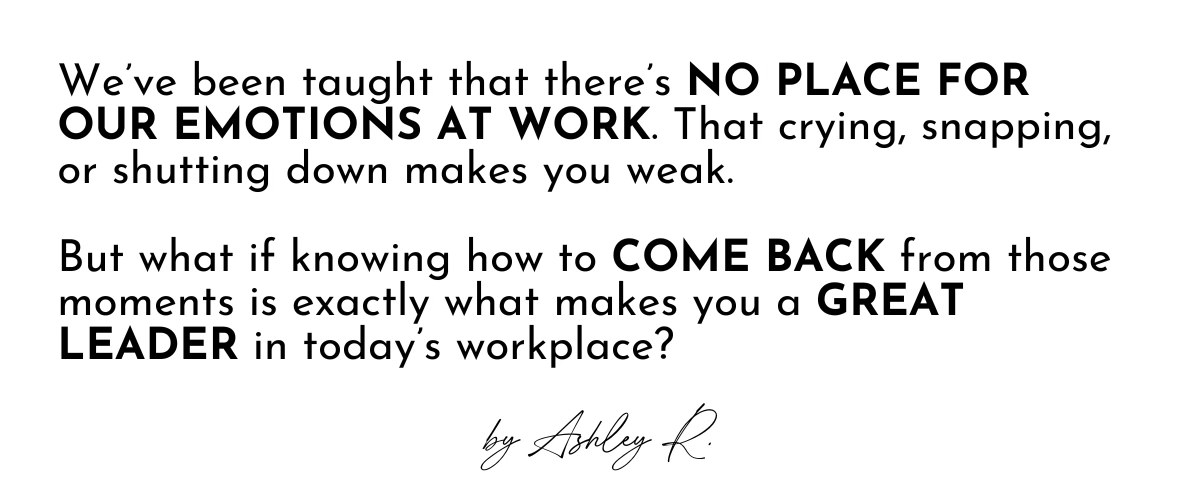I Cried in a Performance Review and Still Got a 30% Raise. Here's How I Did It.
My playbook for high performers who got lost in their emotions, just for a moment.
Welcome to this week’s edition of Reframed by Ashley R. I write for high achieving professionals who rarely get the space to think through what they want next or how to lead in a way that actually works for them.
I'm Ashley Rudolph—a former tech executive turned coach for leaders and next-gen execs in the creative, tech, and lifestyle industries.
Last week, I was interviewed by Kelsey Donlon on the Grey Areas podcast. The conversation flowed like I was catching up with an old friend, even though we’d just met the moment we hit record. We talked, we laughed, we went deep, we had a few revelations.
Throughout the entire conversation, we covered everything from managing Gen Z to navigating office politics to influencing coworkers. I even shared what it felt like to lead during a layoff. And something sparked this post. I shared a story about the moment I unexpectedly broke down during a performance review, overcome with emotion…mid-conversation. Yes, tears and all. Listening back to the podcast episode reminded me how little we talk about emotion at work. We typically don’t even talk about it until it shows up in real time, when all you want to do is pretend it didn’t happen.
So let’s get into it.
→ TUNE IN AND SHARE YOUR THOUGHTS
Listen to my conversation with Kelsey Donlon on The Grey Areas podcast:
How to Come Back from a Bad Day: Getting Over Losing Your Cool at Work
THE SCENE: STORY TIME
It happened in a closed conference room.
One of those rooms with whiteboard walls—where half-finished ideas were scribbled in dry erase marker and no one ever really knew what conversations were unfolding behind closed doors.
I was sitting across from the best manager I’d ever had in a high-stakes conversation about compensation and recognition. One I had prepped for. One I had every right to be in.
Midway through my carefully structured case for a raise, it happened.
I cried.
Not the one-tear, look-away, brush it odd kind. The full body, voice shaky, can't catch your breath kind of tears. It wasn’t planned. It wasn’t even predictable.
I had been holding it in for so long that I just couldn’t any more.
Then, as if on cue, as I was trying to compose myself, the CEO of the company barged in. The conference room looked empty from the outside (lucky me!).
He froze. I froze.
My manager jumped in and handled it flawlessly as I was trying to hold it together in real time.
So now I’m crying. In a closed room. In front of my manager the COO and the CEO.
But here’s what actually happened next: We changed rooms. I took a deep breath. I stayed in the conversation. I made my case. And I got the raise. A 30% raise.
LET’S HAVE SOME FUN. TIME FOR A QUICK POLL →
INTRODUCTION: WHEN EMOTIONS RUN HIGH FOR HIGH-ACHIEVERS
The Emotional Tipping Points We Don’t Talk About
There are some people that breeze through the office like a thunderstorm or a tornado without a single care for the damage they leave behind when their emotions get the best of them. But it’s the opposite for high achievers, after more than 600 hours of coaching emotionally intelligent leaders, this is what I’ve learned: The moments we fear the most at work aren’t usually high stakes events (like big projects, meetings, etc). The moments we fear the most at work are emotional flashpoints →
That quiet 2-day shutdown.
That Slack message you typed and retyped 6 times, still fuming.
That meeting where you were so close to quitting but said “no worries!” instead.
Emotional flashpoints occur after we feel like our work isn’t valued, we aren’t respected or considered, we made a mistake, or we feel like we’re stuck. And when we have an emotional response to those triggers, we feel like we’ve damaged our image, lost control, and ruined our credibility.
Here are the 3 most frequent ways that high achievers lose control and why:
Frustration that turns into quiet withdrawal. You stop contributing. Stop engaging. You go quiet. And people realize something is off (maybe they even start walking on eggshells around you) but what they don’t realize is you’ve already checked out.
Anger that escapes before you catch it. You snap. Or you say something sharp. And you either don't notice it or you instantly feel the heat of regret rise up after the words escape your body.
Tears that seem to come out of nowhere. Except they don’t. You’ve been pushing through. Swallowing discomfort. Staying “professional". Until one comment tips you over the edge.
Each of these moments can feel like a threat to your career. But they’re not.
They’re data. These moments themselves don’t matter as much as what you do next. Because you have a choice in how you respond, how you reset.
Take a pause here and think about it: When was the last time you felt like you blew it at work? What did you do? What happened next?
REALITY CHECK: THE IMPACT
Why Emotions at Work Feel Like a Shock to the System
Let's be honest, many of these moments can feel incredibly uncomfortable. Especially if you’re the calm one. The strategic one. The always-got-it-handled one.
When you cry, snap, or go silent, people around you are often stunned because no one saw how much you were holding inside. You didn’t show it.
You are really good at performing composure. It's what high achievers do. You have a knack for staying cool under pressure, but when something rattles you — what goes on inside of you is anything but cool.
Composure isn’t the only way to be credible. Sometimes holding it together too hard just means you’re not saying what you actually need. When you figure out how to navigate emotional moments for yourself and come back from them, you’re better equipped to show up when someone on your team hits their own wall.
WORK WITH ME
→ Ready for a smarter strategy behind your next move?
That’s the work we do inside Elevate — a one-on-one coaching experience for high performers navigating career pivots, leadership growth, or defining what’s next.
THE FRAMEWORK: INTRODUCING THE RESET
I didn’t fall apart in that room (well I did, but I rebounded!). I didn’t spiral. I didn’t abandon the conversation.
I reset.
And that moment became the foundation for a tool I now teach to leaders navigating high-stakes, high-emotion environments.
Taking a moment to reset isn’t about fixing yourself. It’s just getting back to you…once you’ve caught your breath. The version of you that can identify the feeling, take a breath, and decide what happens next.
How to RESET
A reset is what happens after the emotional moment. It’s how you get your voice back. And shift to action.
Here’s how to reset after crying
Crying at work is disorienting, especially for the person who’s usually rock solid. But it doesn’t mean you’re weak. It means something important that was brewing underneath the surface finally found its way out.
To RESET:
Name what’s happening. Say “I’m overwhelmed because this matters.”
Choose your next move. Be honest with yourself about whether you (1) Can you keep going? Or (2) Do you need a moment?
If you can keep going: Say “I’m okay to continue. I just really care about this”
If you need to step away: Say “I need [a few minutes, a few hours, a day] to collect myself. I want to come back to this when I'm ready.”
When you return, clarify. Say “Here’s what I want to make sure is clear...”
In my case, I stayed. I kept going. And when I clarified how much this mattered, my manager—who didn’t know how much I’d been holding—acted. Fast. With a 30% raise.
The tears weren’t the setback. Silence would have been. Not being clear on what I wanted the outcome to be would have been a mistake. He was listening, I just needed to tell him how to help me fix the core issue that was bugging me so much.
Here’s how to reset after an angry outburst
Anger is usually protecting something: a value, a boundary, a moment you felt dismissed. It doesn’t make you irrational. It makes you human.
To RESET:
Name what’s underneath. Say “That triggered me because you crossed a line with me.”
Create space. Say “I want to come back to this conversation when I’m more clear headed.”
Return with intention. Say “Earlier, my frustration got the best of me. Here’s what I meant to say...”
You don’t need to deny the emotion. You do need to own the impact and show that you're capable of moving past it.
Here’s how to reset after shutting down
When you’re discouraged, it can look like distance. You say less. You care less. You fade. And because it looks like you’re coping with the situation, no one checks in. But inside? You’re checked out.
To RESET:
Get honest with yourself. Reflect on these questions → What do you wish someone noticed? What are you avoiding because they haven't?
Name the shift. Say “I’ve felt off and honestly, I've been a bit disconnected from my work. I want to talk about how to get on the same page with you again.”
Ask for what you need. Maybe it’s feedback. Support. Clarity. Space.
Remember: disengagement is a message. You'll start to feel better once you uncover the real reason behind why you feel disengaged. A reset helps you translate it before it turns into a resignation letter.
THE WRAP UP
Luckily, You Are Not Defined by Your Most Emotional Moment
You don’t have to pretend any of these things didn’t happen. You don’t even have to erase it. You just have to know how to reset.
And when you do? You return clearer. Louder. Stronger.
Emotion isn’t the problem. Not knowing how to come back from it is.
Let me know—what was your moment? When did you feel like, “Did I just blow it at work?”
I’d love to hear it.
Good luck! See you next week.
Ashley
PS - go ahead and forward this to someone who’s had a day. We’ve all been there.
LEVEL UP
Work with me
You don’t need another mantra. You need a better way to move through moments like these.
If this post hit close to home and if you’re tired of holding it all together while silently spiraling, I’d love to work with you.
I coach high-achieving leaders who are done over-functioning and ready to lead with clarity, confidence, and calm. Think: personal strategist meets thought partner.
I help you spot the pattern, name what’s not working, and shift into something that actually does.
Ready to have me in your corner?
SOME QUICK UPDATES
What I’ve been up to lately
Podcast appearances. Who knew I loved to yap?
The podcast I co-host with Winy Bernard Bertin is back. The Impactful Conversations Effect Season 2 premiered with Babba Rivera, CEO of Ceremonia. This conversation is beautiful and an easy listen. We talk reinventing yourself and carving out your own version of success. Link → The Evolution of Babba Rivera
Mentioned in this week’s newsletter, my guest appearance on Kelsey Donlon’s Grey Areas podcast is a must listen. Links → Apple Podcasts | Spotify
Deep diving into design and the visual inspirations behind this brand. More on that in a few weeks…
“Touching grass”. Spring is here and it’s time for me to emerge from my cave. You can catch me (1) at the movies (I saw an early screening of The Amateur last weekend and Rami Malek did a surprise drop in!!) and (2) at events or coffees—I’m very much into meeting ambitious women in NYC.






This is great advice Ashley!
When I saw the title, I knew it was you 😄.
This is super interesting, and most aspiring leaders should read it, as emotion management is not only about controlling yourself whatever happens. It's also managing the aftermath of an emotional burst, which can happen to everybody.
The best example I've seen are professional tennis players. Tennis is an extremely tough sport, physically and mentally. The best players (if you except Roger Federer who was made of stone) are the ones who burst emotionally, then focus back on what they were doing, and end to win the game. This is short term emotion management, but when you're in crisis mode, or under pressure, that's something you must master much more than long term recovery.
So thank you for sharing the long term part as well.